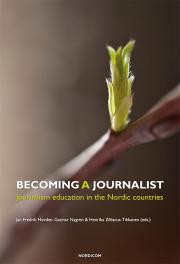The first international anthology on Nordic research on journalism students are finally out, and it can be purchased or downloaded (for free) via Nordicom´s page.

“This edited volume addresses journalism education as a central component of journalistic professionalization, making it necessary to understand what is a crucial period in most future journalists’ lives. Nowadays, journalism scholars are realizing the need for more sustained, in-depth and critical studies of why students embark on such degrees, how they develop their professional views and practices at universities, how the educational curricula of journalism programs match the needs of the labor market, and also, what the news industry thinks about journalism courses and their graduates. This volume addresses all of these important questions in-depth, with admirable attention to different elements that may explain all these issues.
The comparative perspective of looking at the Nordic countries breaks new ground considering the paucity of comparative studies on journalism education in specific media systems. The authors that take part of this book employ an array of quantitative and qualitative approaches to study the field of journalism education, providing a rich account that, no doubt, will be essential reading for students, researchers, the media industry, policy-makers and all people interested in journalism education and professionalization.”
Folker Hanusch, University of Vienna, Austria
Claudia Mellado, Pontificia Universidad Católica de Valparaiso, Chile
Principal investigators, Journalism students across the globe
A presentation of the book was given September 23d to the Nordic journalism teachers conference in Ålesund. Henrika is speaking, Co-editors Jan Fredrik and Gunnar at the window demonstrate not only their keen interest, but also that a year of coordinated work on the book have resulted in a coordinated body language.

The first review of the book is positive. European Journal of Communication says that “looking at journalism education in this comparative way is very welcome, and it is to be hoped that it will be followed in other broad geographical regions”, and that the authors should be “applauded for putting together such a rich assemblage of articles on this topic”.
